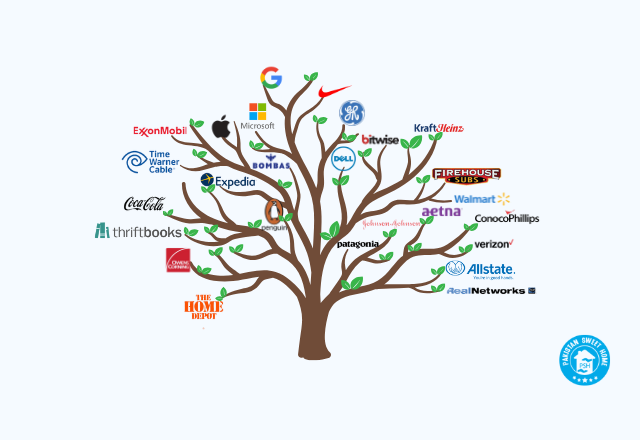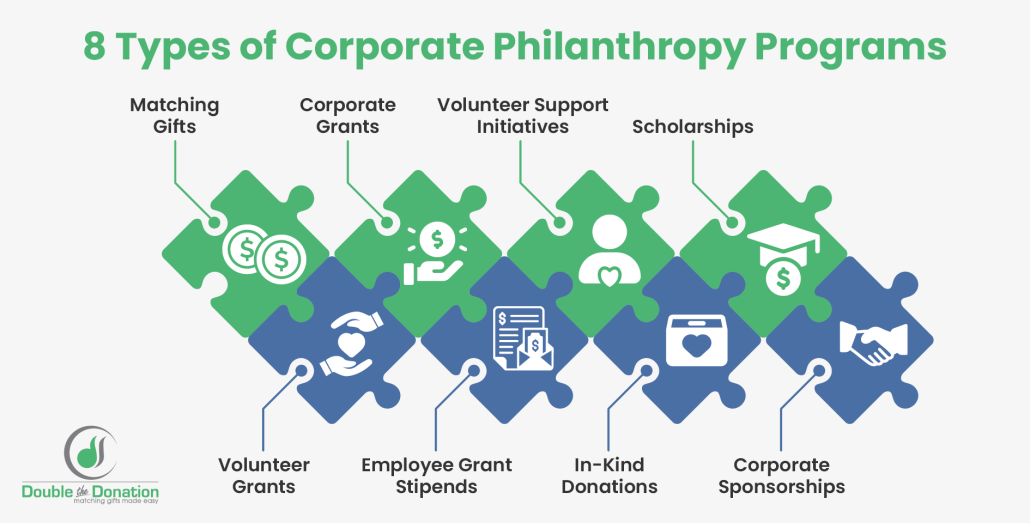Tracking ROI of your corporate philanthropy strategy
Why Business Philanthropy Matters: An Overview to Corporate Social Responsibility
Company philanthropy acts as an essential element of corporate social responsibility. It shows a business's commitment to social problems and boosts its public image. Businesses engaging in philanthropic efforts commonly see enhanced staff member morale and stronger area ties. The real impact of these campaigns can be complex and multifaceted. Understanding the nuances of business philanthropy can illuminate its value in today's organization landscape. What are the crucial variables that drive its success?
The Definition of Corporate Philanthropy
Corporate philanthropy describes the philanthropic payments and initiatives undertaken by organizations to sustain social causes and area development. This principle includes a selection of activities, consisting of economic contributions, worker volunteer programs, and in-kind gifts of services or items. Business engage in philanthropy to address social problems such as education and learning, health care, ecological sustainability, and hardship alleviation.
Typically, company philanthropy is structured through formal programs or partnerships with not-for-profit organizations, enabling businesses to utilize their resources efficiently. These initiatives commonly intend to make a favorable influence on the community while aligning with the company's worths and objective. Additionally, business philanthropy shows a commitment to business social responsibility, showcasing just how businesses can contribute to society beyond profit generation. By getting involved in kind efforts, companies can play a substantial duty in promoting social adjustment and addressing community requirements.
Benefits of Company Philanthropy for Services
Engaging in corporate philanthropy offers countless advantages for businesses, boosting their online reputation and promoting stronger neighborhood connections. Companies that actively join kind initiatives frequently experience increased staff member spirits and commitment. When employees regard their organization as socially liable, they are most likely to feel pleased of their office, causing higher levels of task complete satisfaction and retention.
In addition, corporate philanthropy can develop beneficial networking opportunities. Teaming up with non-profits and neighborhood companies enables businesses to get in touch with like-minded individuals and groups, possibly causing partnerships that can benefit both parties. Additionally, organizations took part in philanthropy might find themselves more enticing to stakeholders and financiers that focus on ethical techniques.
Eventually, corporate philanthropy not only sustains social needs however additionally gives tangible benefits to organizations, producing a win-win scenario that promotes growth and sustainability while adding favorably to the world.
Enhancing Brand Name Commitment Via Social Duty
Enhancing brand loyalty with social responsibility entails structure depend on with consumers by straightening corporate activities with community worths (corporate philanthropy). Business can promote much deeper links with area interaction campaigns that reverberate with their target audience. Furthermore, authentic brand narration can further enhance commitment by showcasing real dedication to social reasons
Structure Trust With Activity
Building trust with action is an effective approach that business can implement to enhance brand name commitment and foster deeper connections with consumers. When businesses proactively involve in corporate philanthropy, they show a commitment to honest practices and social obligation. This proactive method not just boosts their reputation yet additionally reverberates with consumers who prioritize values positioning. Openness in philanthropic efforts is important; firms have to properly communicate their campaigns and the influence they are making. Credibility plays a substantial duty too; consumers are more most likely to sustain brand names that genuinely respect societal problems rather than those that participate in superficial advertising and marketing. Ultimately, by focusing on purposeful activities over plain words, firms can nurture enduring depend on and loyalty among their customer base.
Area Interaction Initiatives

Authentic Brand Name Storytelling
Neighborhood engagement initiatives typically serve as a structure for authentic brand narration, which plays a significant role in cultivating brand name commitment. By sharing authentic stories regarding their social obligation initiatives, business can link emotionally with customers. These tales highlight the brand's worths, goal, and dedication to social improvement, cultivating count on and relatability. When consumers view a brand as socially responsible, they are extra most likely to develop a deeper fondness and choice for it. Genuine storytelling additionally encourages transparency, inviting consumers to involve with the brand name on an individual level. Because of this, services not just boost their credibility yet also develop long-term connections with their audience, inevitably bring about increased commitment and advocacy in a competitive market
The Duty of Workers in Corporate Philanthropy
Staff members play a necessary role in forming a firm's kind efforts with their interaction and involvement. Effective worker engagement techniques can improve volunteerism, causing purposeful community effect. As companies harness the cumulative go to this web-site power and interest of their workforce, they can promote a society of providing that prolongs beyond the work environment.
Staff Member Interaction Strategies
Interaction in company philanthropy promotes a feeling of function that prolongs past mere profit-making. Companies can enhance worker participation by carrying out different techniques that encourage engagement in humanitarian efforts. One reliable approach is to establish a matching present program, where the company matches worker contributions to qualified charities, magnifying their effect. Furthermore, normal interaction regarding philanthropic efforts can produce awareness and inspire workers to contribute their time and resources. Furthermore, providing platforms for staff members to share their charitable passions fosters a sense of possession and neighborhood. Acknowledging and awarding employees for their philanthropic payments can additionally reinforce a culture of providing, inevitably leading to an extra involved labor force aligned with the firm's social duty objectives.
Volunteerism and Neighborhood Effect
Business philanthropy prospers when individuals actively join volunteerism, directly affecting the neighborhoods they serve. Worker participation in volunteer efforts not just enhances firm culture but also promotes a sense of function and connection among personnel. With volunteering, staff members create essential abilities, such as synergy and leadership, which can translate right into improved job efficiency. Additionally, when workers unite for area causes, they enhance their bond with the organization, improving general spirits and commitment. Organizations that encourage volunteerism often see a favorable public photo, as community interaction reflects their dedication to social duty. Eventually, the cumulative impact of staff member volunteer initiatives can change neighborhoods, resolving pressing social concerns while enhancing corporate worths and objective.

Measuring the Impact of CSR Initiatives
As companies significantly invest in company social duty (CSR) efforts, understanding their effect ends up being vital for assessing performance and directing future initiatives. Measuring the impact of CSR requires a see multifaceted strategy, integrating both quantitative and qualitative metrics. Key efficiency indications (KPIs) such as community involvement levels, worker satisfaction, and environmental renovations supply valuable understandings into the results of CSR programs. Surveys and meetings with stakeholders can expose the social change generated by these initiatives, while data analysis helps track development versus set objectives.
Furthermore, straightening CSR goals with organization purposes improves liability. Organizations can utilize structures such as the Worldwide Coverage Initiative or the UN Sustainable Growth Goals to standardize their measurement procedures. Eventually, exact assessment of CSR initiatives not only demonstrates a company's commitment to social duty however also notifies method modifications to optimize favorable effect, promoting a culture of sustainability and neighborhood interaction.
Finest Practices for Implementing Efficient CSR Strategies
Carrying out reliable CSR approaches calls for a clear understanding of an organization's values and objectives, assuring alignment with stakeholder expectations. Successful firms begin by conducting an extensive analysis of their social, environmental, and financial influences, permitting them to recognize areas for improvement. Stakeholder interaction is important; organizations need to proactively involve staff members, consumers, and neighborhood participants in the advancement and implementation of CSR initiatives.
Transparency is another finest method, as it promotes count on and accountability. Business should interact their CSR purposes and progression freely, sharing both difficulties and successes. Additionally, incorporating CSR right into the core service method boosts its influence, making it a fundamental component of procedures as opposed to a second thought. Regular evaluation and adaptation of CSR efforts, educated by stakeholder feedback and altering societal needs, warranty significance and efficiency. By adhering to these practices, organizations can create lasting and purposeful CSR approaches that reverberate with their areas.
Frequently Asked Concerns
Exactly How Can Little Organizations Take Part In Company Philanthropy?
Local business can take part in corporate philanthropy by donating a portion of revenues, sponsoring neighborhood occasions, partnering with nonprofits, offering worker volunteer days, and taking part in social work activities, promoting a positive influence and boosting their brand name reputation.
What Are Usual Misunderstandings Regarding Business Philanthropy?
Usual false impressions regarding business philanthropy include the belief that it's solely a marketing device, that only large business can take part, and that it does not have authentic influence. Many take too lightly the value local business can add via meaningful engagement.
Exactly How Do Consumers Perceive Firms Participated In Philanthropy?
Consumers usually watch firms participated in philanthropy positively, linking such initiatives with business duty, honest behavior, and neighborhood support. This assumption can improve brand name commitment, impact investing in choices, and enhance overall corporate reputation in the marketplace.
Exist Tax Advantages for Businesses Associated With Philanthropy?
Companies included in philanthropy commonly enjoy different tax obligation advantages, such as reductions for charitable payments. corporate philanthropy. These rewards can boost a firm's financial standing while promoting a favorable public image with their community engagement initiatives
Can Corporate Philanthropy Improve Worker Retention Fees?
Corporate philanthropy can improve employee retention rates by cultivating a sense of objective and belonging amongst staff. Involved staff members, aligned with firm values, are more probable to continue to be pleased and dedicated within their functions.
Corporate philanthropy offers as a vital part of corporate social obligation. Business philanthropy refers to the charitable contributions and efforts taken on by organizations to support social reasons and community development. Additionally, corporate philanthropy shows a commitment to business social duty, showcasing exactly how companies can add to society beyond profit generation. Engaging in company philanthropy deals countless benefits for services, boosting you can look here their track record and fostering stronger community connections. Consumers typically check out business engaged in philanthropy positively, linking such efforts with corporate obligation, honest habits, and area assistance.